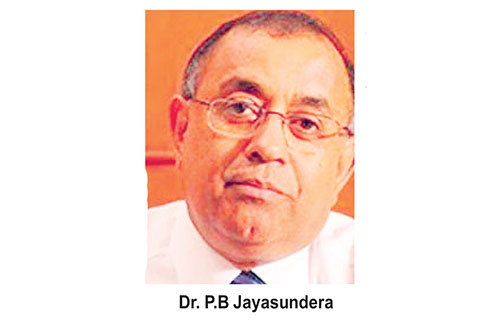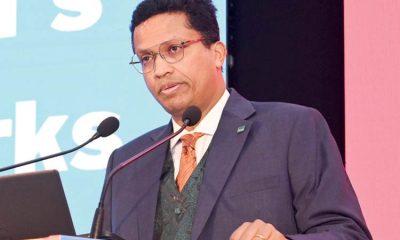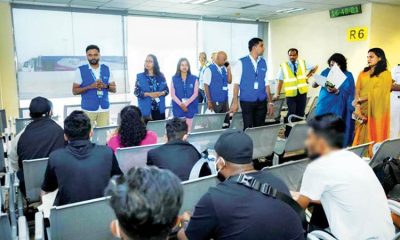Business
‘Tax system to be simplified to facilitate revenue-collection’

By Hiran H.Senewiratne
The government is not receiving ample tax revenue to its coffers from the current tax system/structure and the proposed amendment to the 2017 Inland Revenue Act would simplify it and make it more efficient and effective when collecting revenue for the country, Secretary to the President Dr. P.B Jayasundera said at a forum.
” The country’s tax system should be driven by new technology and the Inland Revenue Department online payment system will serve the people in an efficient and effective manner within a little time. Technology driven tax payment systems prevent unnecessary expenditure and time for taxpayers and also the tax collector as well, Jayasundera said at a taxpayer awareness programme, organised by the Inland Revenue Department. The event was held at the Hilton Hotel, yesterday
‘Under the government’s National Policy Framework Vistas of Prosperity and Splendour, the proposed amendment to the Inland Revenue Act will create an environment to encourage taxpayers to pay taxes without evading, he said
‘For the first time in the history, The Inland Revenue Department, Sri Lanka Customs and Excise Department would be involved in increasing and improving national productivity, which most of the time acted as only revenue collectors, he said.
Dr Jayasundera said that currently there are only 20 percent e- files in the country but with the new amendment to the Inland Revenue Act they could be increased 100 percent with the introduction of new technology that would enable taxpayers to pay taxes through electronic devices.
” We are not happy when we look at the global ‘Doing Business Index’, because Sri Lanka’s revenue collection system is neither efficient nor effective nor simple. The simplified tax system would enable to create some attitudinal change for tax payers in the country,”he said.
He said that the legal system, tax administration and new technology should work together to reap real benefits for the country and the tax payers, which will assist to increase revenue at a considerable level. ‘Therefore, 80 percent tax revenue collected from 20 percent of tax paying people, could be increased to 90 percent or 95 percent with a simplified ,efficient and effective system, Jayasundera said.
Business
Future Connect: Hutch and University of Sri Jayewardenepura kick off exclusive knowledge-sharing series

Hutch collaborated with the Faculty of Computing at the University of Sri Jayewardenepura to conduct an exclusive knowledge-sharing session for third-year undergraduate students. The event, held at the university, was part of Future Connect, an innovative initiative aimed at preparing the next generation for the technologies of tomorrow. By bridging the gap between academic learning and real-world applications, the event highlighted Hutch’s unwavering commitment to empowering young minds with the skills and insights needed to thrive in an ever-evolving digital landscape. With a focus on emerging trends and future technologies, Future Connect ensures that students stay future-ready and equipped to become the tech leaders of tomorrow…
The session covered key topics in telecommunications, starting with data communication and networking, including network traffic analysis, troubleshooting, and optimizing for real-time applications. Legal and ethical aspects of data transmission and strategies for assessing network performance were also discussed. The focus then shifted to enterprise resource planning (ERP) systems and their role in customer management, supply chain, HR, and billing. The day concluded with a session on soft skills, including CV writing, interview preparation, and career development.
Prof. Prasad M. Jayaweera, Dean of the Faculty of Computing, University of Sri Jayewardenepura, emphasized the importance of such collaborations, stating, “We are delighted to collaborate with Hutch in this knowledge-sharing initiative, which bridges academia and industry. This session not only enriches our students’ understanding of real-world applications but also inspires them to innovate and excel in the evolving field of technology. Partnerships like these are instrumental in shaping the future of computing professionals in Sri Lanka.”
Saumitra Gupta, CEO of Hutch Sri Lanka, shared his thoughts on the initiative, saying, “At Hutch, we believe in empowering the next generation with the tools and insights they need to thrive in a digital-first world. Collaborating with the University of Sri Jayewardenepura allows us to share our industry expertise, fostering innovation and nurturing talent that will drive Sri Lanka’s technological advancements. We are proud to support the development of future leaders in technology.”
This initiative highlights Hutch’s steadfast dedication to technological advancement and education, reaffirming its position as a leader in knowledge-sharing and innovation in Sri Lanka.
HUTCH Sri Lanka, a subsidiary of CK Hutchison Holdings (CKHH), is a major player in the Sri Lankan telecom industry. CKHH, a Hong Kong-based Fortune 500 conglomerate, operates in over 50 countries across six sectors, including Telecommunications, and reported revenues nearing USD 60 billion in 2023.
Entering the Sri Lankan market in 1997, HUTCH has grown significantly, launching GSM services in 2004, 3G in 2011, and 4G in 2018. The 2019 acquisition of Etisalat Sri Lanka further strengthened its market presence, enabling it to serve customers on both 078 and 072 prefixes. Currently, HUTCH’s 4G network covers 95% of Sri Lanka’s population, and the company is 5G-ready to support the nation’s digital aspirations.
With affordable, reliable connectivity, HUTCH serves as a key driver in Sri Lanka’s telecommunications growth, expanding access to communication, business efficiency, and entertainment across even the most remote regions.
Business
‘Drive Your Dream Sooner’ with Pan Asia Bank’s hassle-free vehicle leasing

Pan Asia Bank is making vehicle ownership easier and faster than ever with its latest leasing offer – ‘Drive Your Dream Sooner’. Customers can now enjoy one-day lease approvals and the added convenience of importing vehicles hassle-free with the bank’s Letter of Credit (LC) facility. With this exclusive offer, Pan Asia Bank continues to set new standards in the banking industry by providing swift and seamless leasing solutions tailored to customers’ needs. Pan Asia Bank’s leasing service is backed by an unparalleled commitment to customer satisfaction.
Customers can expect their lease to be approved within just one day, minimising delays so you can get behind the wheel sooner. Dedicated leasing specialists provide guidance on choosing the right leasing plan to suit every customer’s financial situation. With the bank’s LC facility, customers can import their preferred vehicle effortlessly, eliminating complexities related to documentation and import regulations. Furthermore, competitive interest rates and tailor-made repayment options ensure affordability and ease of payment.
Commenting further, Shiyan Perera, Assistant General Manager – Retail Banking, said, “At Pan Asia Bank, we understand the importance of owning your dream vehicle, which is why we’re proud to offer our innovative and customer-centric solution ensuring that we make the process as easy and accessible as possible for everyone. With fast approvals, expert advice, and hassle-free vehicle imports, we are helping our customers turn their dream into reality.”
With a strong reputation for innovation and customer-centric banking, Pan Asia Bank remains committed to delivering financial solutions that empower customers to achieve their aspirations. Customers can visit any Pan Asia Bank branch to apply for leasing, making it easier to access financial solutions wherever they are.
Business
Implementation seen as key to Budget 2025’s success

By Ifham Nizam
Despite the 2025 budget’s optimistic outlook, implementation remains the key to its success, warned Nandika Buddhipala, Chief Financial Officer of Commercial Bank PLC.
Speaking at a post budget seminar on Wednesday organized by the National Chamber of Commerce of Sri Lanka, Buddhipala stressed that while tax reforms and fiscal discipline are necessary, businesses will need clarity on regulatory frameworks—especially concerning VAT changes, investment incentives and trade policies.
In response to a question posed by The Island Financial Review, he added: “Budget 2025 sets the foundation for growth, but execution will be the true test. If we can manage debt effectively, encourage exports and attract investors, we can create a resilient economy.”
Buddhipala added: “We appreciate the government’s efforts in aligning the budget with the Public Finance Management Act and the IMF Debt Sustainability Framework. However, it is critical that we remain aware of the persistent debt servicing and interest cost burden.
“Sri Lanka’s high borrowing costs mean that interest payments remain a significant portion of government expenditure. Policymakers should adopt concrete plans for reducing this burden while ensuring economic stability.
“We must create an environment that fosters exports and attracts FDI. The emphasis should be on trade-oriented sectors rather than industries that do not contribute to foreign exchange earnings.
“The government’s aims to strengthen ties with ASEAN nations through participation in the Regional Comprehensive Economic Partnership (RCEP), is a move that could boost trade and investment opportunities.
“We need to expand Double Taxation Agreements (DTAs) beyond the current 46 countries. This would increase investor confidence and facilitate smoother trade flows.
“The proposed Development Bank, which seeks to provide financial support for SMEs and new entrepreneurs, is a positive step but access to finance must be streamlined.
“Providing tailored financial solutions for SMEs is essential. However, ensuring that the Development Bank is efficiently integrated into the existing banking system will determine its success.
“This budget is a strategic response to economic challenges. We need to strike a balance between private sector-driven growth and state intervention to ensure stability and equitable distribution of wealth.”
Meanwhile an official explained in response to another query raised by this newspaper: “The first reading of the budget, which will be followed by a month-long discussion in a budget-related forum, aims to clarify ambiguities and refine implementation strategies. There are a lot of concerns regarding implementation, but this one-month period allows us to fine-tune certain aspects.”
A senior Finance Ministry representative added the following: “We have to consider international expectations and commitments, especially in the context of the International Monetary Fund (IMF) agreements. The recent IMF release of USD 330 million following policy adjustments shows the importance of staying within global economic expectations.
Hasitha Radella of KPMG Sri Lanka, presenting an overview of tax reforms said that as Sri Lanka continues its recovery, the budget is focused on several taxation reforms. Sustained improvements in fiscal management will be key to maintaining growth momentum for the country.
“Clarifications on the Simplified Value Added Tax (SVAT) system and the transition from SVAT to a Risk-Based Refund System that will streamline the VAT refund process to an efficient process are urgent requirements, said Ms. Iyesha Asanthi, Commissioner, Tax Policy & legislation of the Inland Revenue Department.
She said that if any eligible exporter who exports more than 50 percent of total supplies requires VAT refunds under the new risk-based refund system, such a need could be included in a relevant pilot project.
She added that the current VAT threshold is Rs. 15 million per quarter and Rs. 60 million per year at the standard rate 18%. Due to the current situation in the country, the budget proposals of 2025 do not include tax exemptions or concessions. However, the budget proposals made to amend individuals’ tax rates by increasing tax relief from Rs 1.2 million to 1.8 million and the relaxing of tax brackets could benefit individuals, including employees.
Ms. Jayani Wickrama Arachchi, Director, Fiscal Policy Department of Ministry of Finance, Planning and Economic Development said that with the fiscal space being highly constrained, every policy move must be strategic, ensuring key fiscal targets are protected while safeguarding economic stability in the medium term. Interest payments remain a significant burden, accounting for substantial government recurrent expenditure, primarily due to Sri Lanka’s high borrowing costs.
She added: “We need to move ahead despite these challenges.”
-

 Sports6 days ago
Sports6 days agoRemarkable turnaround for Sri Lanka’s ODI team
-

 Business6 days ago
Business6 days agoUN Global Compact Network Sri Lanka: Empowering Businesses to Lead Sustainability in 2025 & Beyond
-

 Features6 days ago
Features6 days agoScammed and Stranded: The Dark Side of Sri Lanka’s Migration Industry
-

 Features5 days ago
Features5 days agoDon’t betray baiyas who voted you into power for lack of better alternative: a helpful warning to NPP – II
-

 News7 days ago
News7 days agoSpeaker agrees to probe allegations of ‘unethical funding’ by USAID
-

 Features5 days ago
Features5 days agoTwo films and comments
-

 News3 days ago
News3 days agoCommercial High Court orders AASSL to pay Rs 176 mn for unilateral termination of contract
-

 Sports2 days ago
Sports2 days agoSri Lanka face Australia in Masters World Cup semi-final today











